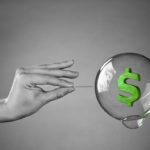Special to the Financial Independence Hub
The word “bubble” is bandied about often to explain quick and often unwarranted run-ups in securities prices. If you use the word in that context in a general conversation about economics, most people will have a quick, intuitive understanding of what you’re talking about.
Interestingly, two of the most prominent financial economists have radically different definitions of the term. In fact, one of them goes so far as to suggest that the word “bubble” is itself a misnomer that is all but meaningless.
A half dozen years ago, Professors Robert Shiller of Yale and Eugene Fama of the University of Chicago shared the Nobel for their contributions to the understanding of asset pricing. Many people have since speculated that the people in Stockholm who award the prize chose to give it to the two men concurrently in order to avoid implicitly “taking a side” in the debate about what constitutes bubbles. While I respect and admire both men immensely, you need to understand that they are rivals of sorts. The Nobel people likely wanted to recognize both without getting involved in a political and sometimes dogmatic battle of wits.
For about a generation now, I’ve been using products based on Fama’s research as the primary set of core holdings for my clients. Based on a recent conversation with one of that company’s representatives, that’s about to change. Basically, the company threatened to stop working with me simply because I told them I was inclined to subscribe to Shiller’s definition of a bubble.
Irrational exuberance
I’m currently reading the third edition (2014) of Shiller’s groundbreaking book “Irrational Exuberance.” He gets straight to the point. In the preface, he writes:
Maybe the word bubble is used too carelessly. Eugene Fama certainly thinks so. Fama, the most important proponent of the “efficient markets hypothesis,” denies that speculative bubbles exist. In his 2014 Nobel lecture, Fama states that the word bubble refers to “an irrational strong price increase that implies a predictable strong decline.” If that is what bubble means, and if predictable means that we can specify the date when a bubble bursts, then I agree with him that there may be little solid evidence that bubbles exist. But that is not my definition of a bubble, for speculative markets are just not so predictable.
Obviously, it’s all fine and well for Shiller to say what a bubble isn’t, but it should be obvious that it behooves him to go on to offer what his own definition might be. He provides a concise explanation (definition?) in chapter 1:
Irrational exuberance is the psychological basis of a speculative bubble. I define a speculative bubble as a situation in which news of price increases spurs investor enthusiasm, which spreads by psychological contagion from person to person, and, in the process, amplifies stories that might justify the price increase and brings in a larger and larger class of investors, who, despite doubts about the real value of the investment, are drawn to it partly through envy of others’ successes and partly through a gambler’s excitement.
Basically, I agree with Shiller on both counts … that Fama’s point is fair if one’s definition implies predictability, but that Shiller’s point (and definition) is more practical. I certainly do believe that bubbles exist and I make absolutely no claim to be able to predict anything about when, how or why they will burst.
Just because we can’t do anything predictive with their existence doesn’t cause them to not exist. More to the point, just because you can’t reliably determine when, how or why they might burst doesn’t mean you should fail to act against their bursting. Basically, Fama’s view is that bubbles don’t pop because bubbles don’t exist … after all, if they existed, we would all recognize that we were in a bubble and take steps to protect ourselves before the bubble pops.
It’s like the Wizard of Oz telling Dorothy not to look behind the curtain. To be clear, I see very few people taking steps to protect themselves against a securities prices bubble (especially in the U.S.) right now … and I absolutely DO think we’re in a bubble. Maybe Fama’s point about the failure to reliably identify bubbles in advance is what causes bubbles to get so big in the first place.
If bubbles could be reliably identified in advance, they’d be arbitraged out of existence … just like securities mispricings as explained by the Efficient Markets Hypothesis (EMH). Is it possible that EMH works very well in a micro (i.e., company vs. company) level, but poorly in a macro (i.e., looking at stock markets in aggregate) way?
 John De Goey, CIM, CFP, FP Canada™ Fellow, is a Portfolio Manager with Toronto-based Wellington-Altus Private Wealth Inc. This blog originally appeared on the firm’s “Newswire” site on Feb. 7, 2020 and is republished on the Hub with permission.
John De Goey, CIM, CFP, FP Canada™ Fellow, is a Portfolio Manager with Toronto-based Wellington-Altus Private Wealth Inc. This blog originally appeared on the firm’s “Newswire” site on Feb. 7, 2020 and is republished on the Hub with permission.
Share this:
- Click to share on X (Opens in new window) X
- Click to share on LinkedIn (Opens in new window) LinkedIn
- Click to share on Facebook (Opens in new window) Facebook
- Click to share on Reddit (Opens in new window) Reddit
- Click to email a link to a friend (Opens in new window) Email
- Click to print (Opens in new window) Print


